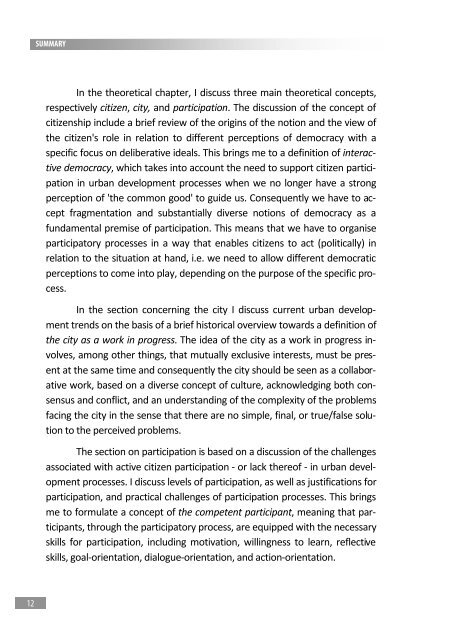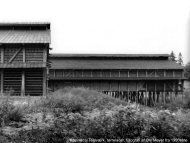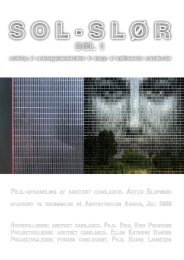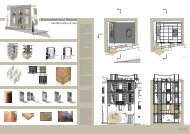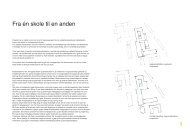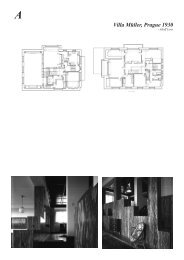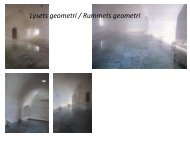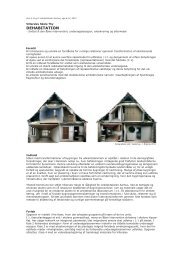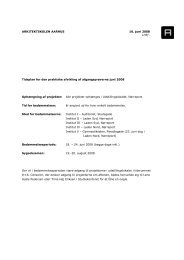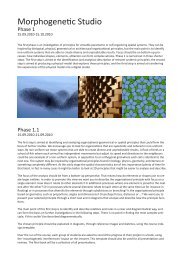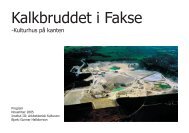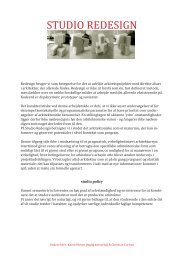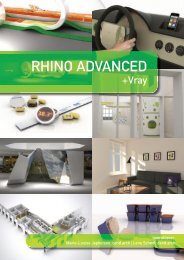- Page 1 and 2: den igangværende by
borgerdelt
- Page 3 and 4:
den igangværende b
- Page 5 and 6:
”…Alice
started
to
- Page 7 and 8:
INDHOLD cases 243
det ny
- Page 9 and 10:
RESUMÉ I
afhandlingens
- Page 11:
SUMMARY summary In
my
P
- Page 15 and 16:
DEN IGANGVÆRENDE BY deres
- Page 17 and 18:
DEN IGANGVÆRENDE BY eller
- Page 19 and 20:
DEN IGANGVÆRENDE BY ”Bru
- Page 21 and 22:
DEN IGANGVÆRENDE BY sig
- Page 23 and 24:
DEN IGANGVÆRENDE BY erfari
- Page 25 and 26:
DEN IGANGVÆRENDE BY gen
- Page 27 and 28:
DEN IGANGVÆRENDE BY ’Sma
- Page 29 and 30:
DEN IGANGVÆRENDE BY for
- Page 31 and 32:
DEN IGANGVÆRENDE BY ser,
- Page 33 and 34:
DEN IGANGVÆRENDE BY For
- Page 35 and 36:
DEN IGANGVÆRENDE BY tet
- Page 37 and 38:
DEN IGANGVÆRENDE BY ker
- Page 39 and 40:
DEN IGANGVÆRENDE BY In
t
- Page 41 and 42:
DEN IGANGVÆRENDE BY The
- Page 43 and 44:
DEN IGANGVÆRENDE BY ing
- Page 45 and 46:
PROJEKTETS METODE Afhandlin
- Page 47 and 48:
PROJEKTETS METODE participa
- Page 49 and 50:
PROJEKTETS METODE I
a
- Page 51 and 52:
PROJEKTETS METODE I
PAR,
- Page 53 and 54:
PROJEKTETS METODE indskrivn
- Page 55 and 56:
PROJEKTETS METODE selvfølg
- Page 57 and 58:
PROJEKTETS METODE ge
at
- Page 59 and 60:
PROJEKTETS METODE konsensus
- Page 61 and 62:
PROJEKTETS METODE detaljere
- Page 63 and 64:
PROJEKTETS METODE participa
- Page 65 and 66:
PROJEKTETS METODE Samtidig
- Page 67 and 68:
PROJEKTETS METODE research
- Page 69 and 70:
PROJEKTETS METODE ourselves
- Page 71 and 72:
PROJEKTETS METODE ber,
me
- Page 73 and 74:
PROJEKTETS METODE sion‐i
- Page 75 and 76:
PROJEKTETS METODE Men
hvi
- Page 77 and 78:
PROJEKTETS METODE
En
- Page 79 and 80:
PROJEKTETS METODE case-base
- Page 81 and 82:
PROJEKTETS METODE Man
kan
- Page 83 and 84:
PROJEKTETS METODE grundlag
- Page 85 and 86:
PROJEKTETS METODE brugen af
- Page 87 and 88:
PROJEKTETS METODE type
is
- Page 89 and 90:
PROJEKTETS METODE tværfagl
- Page 91 and 92:
PROJEKTETS METODE mersion
- Page 93 and 94:
PROJEKTETS METODE -
og
- Page 95 and 96:
BORGER, BY & DELTAGELSE bor
- Page 97 and 98:
BORGER, BY & DELTAGELSE pol
- Page 99 and 100:
BORGER, BY & DELTAGELSE sti
- Page 101 and 102:
BORGER, BY & DELTAGELSE der
- Page 103 and 104:
BORGER, BY & DELTAGELSE bor
- Page 105 and 106:
BORGER, BY & DELTAGELSE of
- Page 107 and 108:
BORGER, BY & DELTAGELSE ris
- Page 109 and 110:
BORGER, BY & DELTAGELSE ræ
- Page 111 and 112:
BORGER, BY & DELTAGELSE I
- Page 113 and 114:
BORGER, BY & DELTAGELSE
- Page 115 and 116:
BORGER, BY & DELTAGELSE ten
- Page 117 and 118:
BORGER, BY & DELTAGELSE ord
- Page 119 and 120:
BORGER, BY & DELTAGELSE def
- Page 121 and 122:
BORGER, BY & DELTAGELSE det
- Page 123 and 124:
BORGER, BY & DELTAGELSE ”
- Page 125 and 126:
BORGER, BY & DELTAGELSE ”
- Page 127 and 128:
BORGER, BY & DELTAGELSE af
- Page 129 and 130:
BORGER, BY & DELTAGELSE ter
- Page 131 and 132:
BORGER, BY & DELTAGELSE kla
- Page 133 and 134:
BORGER, BY & DELTAGELSE 197
- Page 135 and 136:
BORGER, BY & DELTAGELSE en
- Page 137 and 138:
BORGER, BY & DELTAGELSE ”
- Page 139 and 140:
BORGER, BY & DELTAGELSE og
- Page 141 and 142:
BORGER, BY & DELTAGELSE
- Page 143 and 144:
BORGER, BY & DELTAGELSE ”
- Page 145 and 146:
BORGER, BY & DELTAGELSE bli
- Page 147 and 148:
BORGER, BY & DELTAGELSE Vor
- Page 149 and 150:
BORGER, BY & DELTAGELSE mid
- Page 151 and 152:
BORGER, BY & DELTAGELSE vi
- Page 153 and 154:
BORGER, BY & DELTAGELSE Mar
- Page 155 and 156:
BORGER, BY & DELTAGELSE reg
- Page 157 and 158:
BORGER, BY & DELTAGELSE dis
- Page 159 and 160:
BORGER, BY & DELTAGELSE pla
- Page 161 and 162:
BORGER, BY & DELTAGELSE nin
- Page 163 and 164:
BORGER, BY & DELTAGELSE ret
- Page 165 and 166:
BORGER, BY & DELTAGELSE val
- Page 167 and 168:
BORGER, BY & DELTAGELSE Til
- Page 169 and 170:
BORGER, BY & DELTAGELSE sty
- Page 171 and 172:
BORGER, BY & DELTAGELSE det
- Page 173 and 174:
BORGER, BY & DELTAGELSE for
- Page 175 and 176:
BORGER, BY & DELTAGELSE dir
- Page 177 and 178:
BORGER, BY & DELTAGELSE væ
- Page 179 and 180:
BORGER, BY & DELTAGELSE ren
- Page 181 and 182:
BORGER, BY & DELTAGELSE mer
- Page 183 and 184:
BORGER, BY & DELTAGELSE wit
- Page 185 and 186:
BORGER, BY & DELTAGELSE Fø
- Page 187 and 188:
BORGER, BY & DELTAGELSE af
- Page 189 and 190:
BORGER, BY & DELTAGELSE cap
- Page 191 and 192:
BORGER, BY & DELTAGELSE tag
- Page 193 and 194:
STRATEGI & METODE strategi
- Page 195 and 196:
STRATEGI & METODE strategi
- Page 197 and 198:
STRATEGI & METODE dring
t
- Page 199 and 200:
Hvilke
forventninger
h
- Page 201 and 202:
STRATEGI & METODE flydelse
- Page 203 and 204:
STRATEGI & METODE Tradition
- Page 205 and 206:
STRATEGI & METODE Kommunika
- Page 207 and 208:
STRATEGI & METODE kender
- Page 209 and 210:
STRATEGI & METODE learning:
- Page 211 and 212:
STRATEGI & METODE cessen
- Page 213 and 214:
STRATEGI & METODE I
det
- Page 215 and 216:
STRATEGI & METODE Hoffmann
- Page 217 and 218:
STRATEGI & METODE AELIA som
- Page 219 and 220:
STRATEGI & METODE utopiatyp
- Page 221 and 222:
STRATEGI & METODE En
af
- Page 223 and 224:
STRATEGI & METODE “The
- Page 225 and 226:
STRATEGI & METODE konflikt
- Page 227 and 228:
STRATEGI & METODE urban
d
- Page 229 and 230:
STRATEGI & METODE Som
dia
- Page 231 and 232:
STRATEGI & METODE Der
kan
- Page 233 and 234:
STRATEGI & METODE toden
a
- Page 235 and 236:
At
the
group
level:
- Page 237 and 238:
STRATEGI & METODE mere
ra
- Page 239 and 240:
STRATEGI & METODE megen
l
- Page 241 and 242:
STRATEGI & METODE ”[…]
- Page 243 and 244:
cases I
dette
kapitel
- Page 245 and 246:
metodekapitlet
diskutere
- Page 247 and 248:
Det
er
disse
erfaring
- Page 249 and 250:
ge
redskaber
udviklet
- Page 251 and 252:
tegisk
og
metodisk
me
- Page 253 and 254:
forfattede
som
opsamlin
- Page 255 and 256:
Brugere
af
Hovedbiblio
- Page 257 and 258:
Multimediehuset
skal
v
- Page 259 and 260:
projektets
inddragende,
- Page 261 and 262:
Utopiatyping‐dimensionen
- Page 263 and 264:
Scenarier fra konkurrencefo
- Page 265 and 266:
hvert
fald
for
delcas
- Page 267 and 268:
også
afspejles
i
at
- Page 269 and 270:
funktioner
i
huset.
S
- Page 271 and 272:
INDEX
AWARD
2007.
Pro
- Page 273 and 274:
ken/alrum, bryggers med udg
- Page 275 and 276:
Plakater fra Køge Kommune
- Page 277 and 278:
Screendump fra den interakt
- Page 279 and 280:
naerne
repræsenterede
- Page 281 and 282:
nen.
Postkortene
blev
- Page 283 and 284:
hvor
aktørerne
ved
h
- Page 285 and 286:
Udviklingsmålet
her
va
- Page 287 and 288:
I
relation
til
idealm
- Page 289 and 290:
hovedcase 3: co2030 Projekt
- Page 291 and 292:
Projektets
oplevelse
- Page 293 and 294:
Hvorvidt
dette
førte
- Page 295 and 296:
debatten
foregår
på
- Page 297 and 298:
E. Hvor ofte spiser du okse
- Page 299 and 300:
Hver
spiller
skulle
- Page 301 and 302:
funktionen
være
slået
- Page 303 and 304:
Som
det
ses
af
fig.
- Page 305 and 306:
Antallet
af
brugere
i
- Page 307 and 308:
Problemet
er
nemlig,
- Page 309 and 310:
Via
to
touch‐skærm
- Page 311 and 312:
Indtil
videre
har
kna
- Page 313 and 314:
tivere
spørgeskemaet
o
- Page 315 and 316:
bestemte
medietyper.
So
- Page 317 and 318:
deltagelse
i
deres
eg
- Page 319 and 320:
skulle
hvile
på.
Men
- Page 321 and 322:
Men
som
jeg
citerede
- Page 323 and 324:
I
løbet
af
projektet
- Page 325 and 326:
AFSLUTTENDE BETRAGTNINGER a
- Page 327 and 328:
AFSLUTTENDE BETRAGTNINGER d
- Page 329 and 330:
AFSLUTTENDE BETRAGTNINGER t
- Page 331 and 332:
AFSLUTTENDE BETRAGTNINGER M
- Page 333 and 334:
AFSLUTTENDE BETRAGTNINGER i
- Page 335 and 336:
AFSLUTTENDE BETRAGTNINGER I
- Page 337 and 338:
AFSLUTTENDE BETRAGTNINGER m
- Page 339 and 340:
AFSLUTTENDE BETRAGTNINGER f
- Page 341 and 342:
LITTERATUR litteratur ADELM
- Page 343 and 344:
LITTERATUR DE WOLFF, C., DR
- Page 345 and 346:
HEATER, D. 2005. What is Ci
- Page 347 and 348:
NIELSEN, T., ALBERTSEN, N.
- Page 349 and 350:
YLIRISKY, S. P. & BUUR, J.
- Page 351 and 352:
LITTERATUR EBST 2008: Innov
- Page 353 and 354:
Køge Kyst 2010: Kulturakti
- Page 355 and 356:
Aarhus Stiftstidende 2010A:
- Page 357 and 358:


